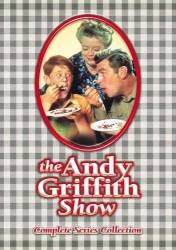Continuity mistake: As Barney is turning in his deputy equipment to resign his handcuffs are hanging out of his pocket. After Barney states he wishes someone would just commit a crime, Opie enters. As the camera pans out so Andy can ask Opie what happened, the handcuffs are no longer in Barney's pocket, and he didn't put them on the desk with the rest of the equipment. (03:03:00 - 03:11:00)
Continuity mistake: When Barney and Andy are looking at Barney's picture on the front page of the newspaper, first, the article has nothing to do with Barney or the arrest, and second, when Barney takes the paper from Andy he folds it with the front page on the outside, and the page we see is not the same front page from the closeup.







Answer: It was a joke. They were supposed to be dumb hillbillies.
Both. According to later interviews with both Andy and the Dillards band (the real name of the band that played the parts of the Darling children, of which Charlene (Maggie Peterson - Mancuso was also a member) the reason the Darling boys never had any lines was because they would've had to have been paid if they spoke. In return for appearing without lines or pay, Andy promised to get as much of their music onto the show as possible which, he did. This obviously gave them a lot of exposure.